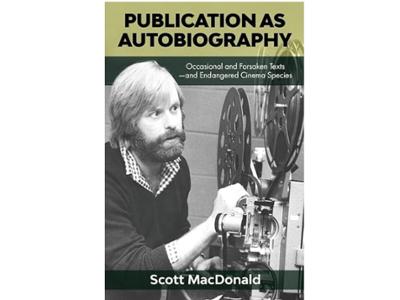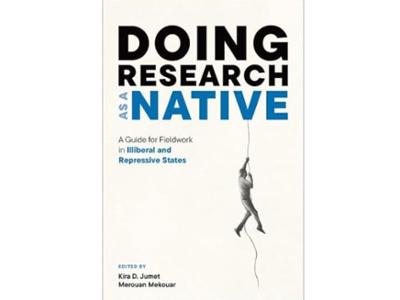Bookshelf
Alumni and faculty members who would like to have their books considered for this listing should contact Stacey Himmelberger, editor of Hamilton magazine. This list, which dates back to 2018, is updated periodically with books appearing alphabetically on the date of entry.
Showing articles tagged with Faculty Book –
-
(Sticking Place Books, 2024)
MacDonald is the author of five volumes of A Critical Cinema: Interviews with Independent Filmmakers and more than two dozen other books. Named an Academy Scholar by the Academy of Motion Picture Sciences in 2011, he says about this work:
Topic -
(Oxford University Press, 2024)
Oscar-winning documentarians, filmmakers, a cine-historian and video-essayist, the list goes on. Throughout this volume, which completes MacDonald’s “avant-doc trilogy,” readers will find interviews and essays that “model a generalist approach to modern audiovisual media, prioritizing remarkable cinematic accomplishments that can get lost within our overwhelming modern mediascape.”
Topic -
(Oxford University Press, 2025).
Along with Merouan Mekouar, a York University social scientist, Jumet compiled “narratives from 19 scholars, representing 15 countries in Africa, Asia, the Caribbean, Eastern Europe, South America, Central Asia, and South Asia, who conducted fieldwork in their native repressive and/or illiberal countries,” according to the publisher’s description.
Topic -
(Lexington Books, 2024)
As the publisher notes, "This edited volume investigates the reconfiguration of gender in French banlieue cinema, interrogating whether the films produced over the last two decades provide new and viable models of resistance to dominant modes of power. Contributors take a critical approach which identifies gender as a marker of both body and identity politics to highlight the need to overcome a binary approach to banlieue aesthetics, which limits inquiry into the basis of conflict. Given that a feminization — and, to some extent, queering — of the once exclusively masculine space is underway, contributors ultimately conclude that the banlieue and its on-screen representations cannot be properly understood unless intersectionality as a systematic approach is applied as an interpretive lens. Scholars of film, gender studies, and sociology will find this book particularly useful."Topic -
(Dendro Ediciones, 2024)
In line with Martínez-Arias's research on migration patterns and the barriers migrants face in Latin America, this novel, the author's third, tells the story of two adolescents who migrate to the outskirts of Lima and confront urban violence, poverty, and discrimination.Topic -
(New York University Press, 2024)
“In the face of numerous challenges, small-scale farming for local markets requires enormous courage and optimism. The decision to become a farmer often arises from a profound desire to uphold certain values and beliefs, driven by the moral and emotional motivations to contribute to a greater good,” notes the publisher.
Topic -
(Arc-Humanities Press, 2024)
This book examines the legend of Prester John (from the Latin “presbyter,” meaning priest), which first came to light through a forged letter that surfaced in Western Europe in the late 12th century. This letter, purportedly from Prester John himself to the Byzantine Emperor Manuel Komnenos, described his immense power and wealth, generating widespread excitement across Europe — particularly at the prospect that John’s armies could aid fellow Christians in the Crusades.While the legend of Prester John and the famous letter have been studied by medievalists for over a century, Eldevik’s research sheds new light on how the letter was copied and circulated in manuscript collections, often alongside works on geography, history, and apocalyptic theology.Topic -
(Modern Language Association of America, 2024)
According to the publisher, “This volume brings a diverse range of voices - from anthropology, communication studies, ethnomusicology, film, history, literature, linguistics, sociology, theater, and urban geography - into the conversation about film from the People’s Republic of China. Essays seek to answer what films can reveal or obscure about Chinese history and society and demonstrate how studying films from the PRC can introduce students to larger issues of historical consciousness and media representation.
Topic -
(University of California Press, 2023)
Everyone speaks with an accent, but what is an accent? This interdisciplinary collection, which was awarded the 2024 René Wellek Prize for Best Edited Collection by the American Comparative Literature Association, introduces accent as a powerfully coded yet underexplored mode of perception that includes looking, listening, acting, reading, and thinking.Topic -
(Basic Books, 2024)
Founded in 1919, the Communist Party USA championed peace, justice, and fairness in society. Its members organized powerful industrial unions, took a stand against racism, and moved the nation left. At the same time, the author notes, communists “maintained unwavering faith in the USSR’s claims to be a democratic workers’ state and came to be regarded as agents of a hostile foreign power.”Topic
Contact
Stacey Himmelberger
Editor of Hamilton magazine










